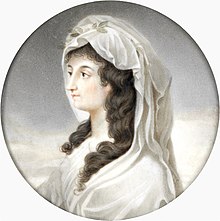Fanny de Beauharnais
Fanny de Beauharnais | |
|---|---|
 | |
| Born | Marie-Anne-Françoise Mouchard 4 October 1737 Paris, France |
| Died | 2 July 1813 (aged 75) Paris, France |
| Spouse(s) | Claude de Beauharnais |
| Father | François-Abraham-Marie Mouchard |
| Mother | Anne-Louise Lazure |
Marie-Anne-Françoise Mouchard better known as Fanny de Beauharnais (4 October 1737, Paris – 2 July 1813), was a French lady of letters and salon-holder. She was the mother of French politician Claude de Beauharnais. She was the grandmother of Stéphanie de Beauharnais, Grand Duchess of Baden, and through her she is the ancestor of the former royal families of Romania and Yugoslavia, and the present royal families of Belgium, of Luxembourg and of Monaco.
Life
[edit]The daughter of the receiver-general of finances in Champagne, whilst very young she married comte Claude de Beauharnais, uncle of Alexandre de Beauharnais and of François de Beauharnais. She was godmother to Hortense de Beauharnais, Alexandre's daughter by Marie Josèphe Rose de Tascher de la Pagerie, better known to history as Joséphine.
She wrote poetry from her childhood onwards and, after separating from her husband, devoted herself to literature, became friends with literary figures such as Claude Joseph Dorat and Michel de Cubières-Palmézeaux. Her salon became a choice social venue, and she became a member of the Académie des Arcades.
In 1787 she wrote and put on a five-act prose comedy entitled la Fausse inconstance, though it was not a success. In 1790 she was received into the Académie de Lyon.
Her detractors attributed her work to Dorat and other friends of hers. The marquise de Créquy, in his Souvenirs, adjudged that Lebrun had very rudely and unjustly applied to her an old epigram of Pavillon about Charlotte-Rose de Caumont La Force:
Eglé, belle et poète, a deux petits travers : Elle fait son visage et ne fait pas ses vers.
Marriage and issue
[edit]On 6 March 1753, she married Claude de Beauharnais and their children were:
- Claude de Beauharnais (1756–1819), 2nd Count des Roches-Baritaud (1756–1819).
- Françoise de Beauharnais (1757–1822)
- Anne de Beauharnais (1760–1831)
Works
[edit]- Mélanges de poésies fugitives et de prose sans conséquence (Paris, 1772, 2 vol. in-8°)
- Lettres de Stéphanie, historical novel (Paris, 1773, in-8°)
- l’Abailard supposé, novel (Paris, 1780, in-8°)
- l’Île de la Félicité, philosophical poem (1801, in-8°)
- le Voyage de Zizi et d’Azor, poem in 5 books (1811, in-8°).
References
[edit]- Gustave Vapereau, Dictionnaire universel des littératures, Paris, Hachette, 1876, p. 217.
External links
[edit]- Writers from Paris
- 1737 births
- 1813 deaths
- French women poets
- Beauharnais
- French salon-holders
- 18th-century French novelists
- 19th-century French writers
- 18th-century French women writers
- 19th-century French women writers
- 18th-century French dramatists and playwrights
- French women dramatists and playwrights
- French women novelists
